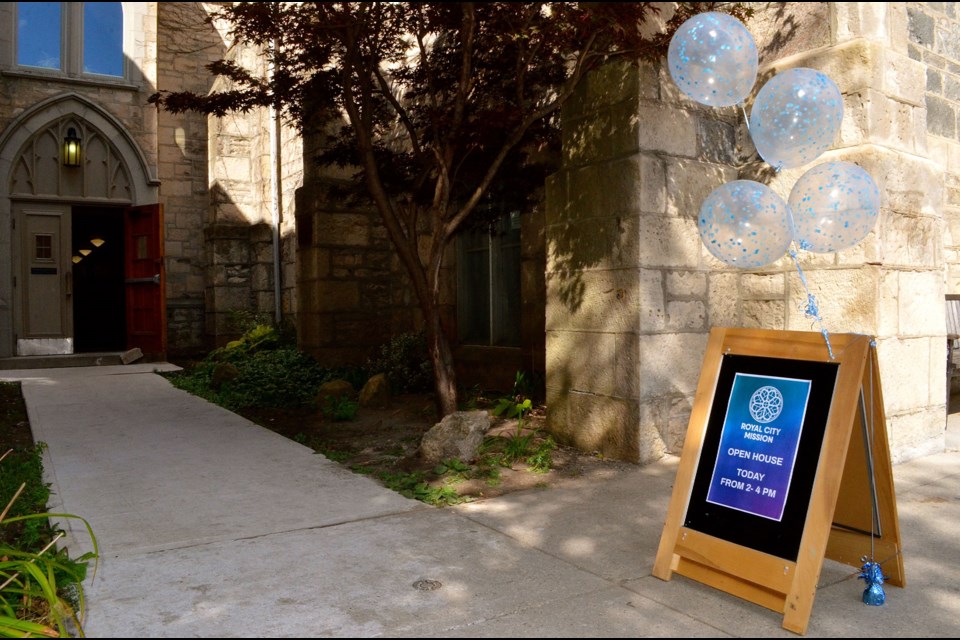Statistics and public perception might indicate otherwise, but Pastor Kevin Coghill and meals and volunteer coordinator Lisa Laws at Royal City Mission on Quebec Street believe we are making progress in tackling the addictions crisis in Guelph.
“In 2018 we did a memorial service,” said Coghill. “I think it was 19 people connected to this community that died for multiple reasons but much of it from overdoses, and this year we have had very few. So, I think it is working.”
He attributes his optimism to a combination of things including controversial services such as the safe injection site and needle exchange program.
“It’s like a lot of things,” he said. “I don’t like drug use. I think it is terrible, but I also don’t want someone to use a dirty needle and I don’t want someone to die because they didn’t have someone who can help them.”
Sometimes that help is as simple as providing friendship and sharing a meal.
“I think they get a sense of community,” said Laws. “They get their stomachs filled and make some friends. They play some games sometimes. There is ping pong and cards. We have a music room and an art room.”
The Royal City Mission meal program serves as many as 100 people a day, six days a week which translates to about 600 meals a week.
“It is a huge group of people that make it happen,” said Coghill. “I think we have 22 church partners, about 10 business partners, a lot of people helping to prepare food, lots of people donating food. There are some super generous people in our community.”
Upgrading their kitchen and rebranding the mission were just a few of the recent changes visitors got to see during an open house at the centre Tuesday.
“We were running with two names, Royal City Church and the Life Centre and it just made sense to solidify that and make it a little easier for people,” said Coghill. “It means less overhead costs too.”
They also made changes to the meal program they have been running for the past 15 years.
“We have been open for years from 6 p.m. to 9 p.m. as our mealtime but this year we are adding open drop-in times from 3 – 6 p.m.,” he said. “We are also adding a meal on Friday that we haven’t had in the past so, that will be a 6 p.m. to 7 p.m. pizza night.”
They even have food available during their Sunday services.
“During our worship service now, we have continental breakfast for people that might not have food,” said Coghill. “So, there is always coffee and bagels just in case someone comes by and often people do come by and grab a coffee. They might not stay but they grab a coffee at least and that’s good.”
Coghill doesn’t look like a stereotypical reverend, in fact, he bristles a bit at the title and jokes that some in the congregation refer to him as the “Ireverend”. Shedding stereotypes and eliminating stigma is a big part of his message to congregants.
“The Evangelical Missionary Church of Canada is our affiliation, which is kind of middle of the road,” he said. “We try to be very conversational in our style. We have a one-hour service, never more because we recognise that most people don’t want to sit for more than an hour. It includes music and conversations and we like people to grab a coffee so we have a little area so people can have a coffee during the service.”
The sanctuary of the former Chalmers United Church was built in 1871with musical acoustics in mind and that has made it a popular venue for concerts and music festivals.
“It’s a beautiful building and it is set up great for concerts,” said Coghill. “We’ve had lots of partnerships. The university has been using it a lot, the Jazz Festival, Hillside Inside and Holy Smokes this year.”
They partner with other service providers for their outreach work.
“That has been a big strength for us,” said Coghill. “We partner very well with the Drop In. We share food back and forth with Hope House. The Community Health van is here with the sharps packages and wound care. The Food Banks give us food when we need food. These are really great organisations and again we are sharing stuff, which is amazing.”
Coghill has a lot of faith in the community’s efforts to solve the problems of addiction and homelessness but he has also heard the critics who describe it as a hopeless cause.
“It makes me think when I hear people talk about giving up on someone,” he said. “If my parents had given up on me I don’t know where I’d be. That is part of the problem. People have given up.”
Guelph city councillor Phil Alt has heard the criticisms as well.
“I don’t think Guelph is atypical in our attitudes,” said Alt. “The one way I think we are atypical is that I think we are more open in our outreach. I think it is important that we don’t gild the lily There is a problem and there is crime but just imagine if a centre like this wasn’t around. I just think point blank it’s not very Christian to give up on people.”
Coghill said shedding stigma is a first step to helping someone.
“We encourage our volunteers to have a meal with people,” said Coghill. “Rather than stay behind the counter, actually go and sit with someone because contact is something that can change our minds about people.”
Laws has seen firsthand the value of that simple act.
“Kevin always says that we are not about the meals,” said Laws. “We’re about the community. We see a lot of the same people here regularly and I like to think we are their community, their extended family. We give them friendship, just plain old friendship. Everyone needs a friend.”



